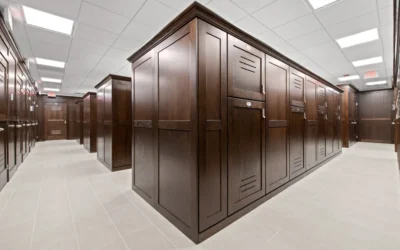Updated September 27, 2022 to include Wayforth and Livible Merger
February 2020 WayForth and Livible announce Merger and are known now as WayForth, Inc.
Livible Inc., the Seattle pick-up-and-delivery storage company founded by serial entrepreneur Terry Drayton, is planning to use a recent infusion of funds to expand into southern California later this year – and hopefully be in the top 40 metro markets in the U.S. within two to three years.
After securing $16 million in funding via a new strategic partnership with Global Logistics Properties, Livible recently expanded its valet-style storage service to San Francisco and has immediate plans to expand into Los Angeles, Orange County and San Diego, hopefully by the end of this year, Drayton said in an interview with the SpareFoot Storage Beat.
Afterward, Drayton said he sees an aggressive expansion across the country, ideally into scores of major metropolitan markets within two to three years. Drayton said he’s also eyeing expansion into Canada and possibly even China, where he sees a newly urbanized population in desperate need of storage services.
“We see an opportunity internationally, yes,” said Drayton, stressing that any overseas expansion could be three or more years away.
Strategic partnership with warehousing partner
Founded in 2013, Livible, previously known as Storrage, currently has facilities in Seattle, Portland and Boston—where it expanded via its 2017 purchase of Fetch Storage, an early pioneer in valet storage—in addition to its new San Francisco facility.
Besides using funds for geographic expansion, Livible is also using its cash from Global Logistics Properties, the world’s second largest industrial landlord (mostly warehouses), to beef up its tech staff, hire more sales personnel and increase the firm’s marketing efforts, said Drayton.
Drayton said he’s pleased that Livible has teamed up with GLP because of its logistics know-how and connections to industrial properties.
“This is a strategic partnership, not a venture capital investment,” he said. “They’re playing the long game. We’re not trying to flip the company. We want to build it.”
Jumping over the awareness hurdle
While optimistic about the long-term future of valet storage – also variously known as “on demand” and “concierge” storage – Drayton said the biggest challenge for the relatively new industry niche is simply making potential customers aware that it even exists.
Most people still associate storage with hauling items themselves to a traditional self-storage facility, unloading and storing them, and then later picking up items when they need them.
At companies like Livible, Clutter and other valet-style storage firms, people can call to have items picked up and shipped to facilities, then call to have items returned right to their home or office.
The pick-up-and-delivery model may sound more expensive – considering it requires firms to own or lease trucks and to hire personnel to retrieve and return items, Drayton said. But Livible actually saves money by storing items in less expensive warehouses, not traditional self-storage facilities with individual lockers and cages.
Livible also charges by the amount of items that people actually store, not by the size of individual storage units they rent, he said.
The more the merrier
Michael Cappelletti, founder and CEO of Cubiq, a valet-storage company in Boston, agrees that “product awareness” is a key challenge for pioneers in valet-style storage.
“There’s a perception out there that it must be more expensive – and it’s not,” Cappelletti said, echoing Drayton’s contention that use of warehouses and offering non-traditional pricing schemes ultimately lower costs for customers.
As for Livible’s recent entry into the Boston market via its purchase of Fetch Storage in late 2017, Cappelletti, who founded Cubiq in 2013, says he welcomes it. “Competition raises awareness,” he said. “I actually like seeing Livible trucks in town. They only help get the word out about the sector.”
“There’s enough (valet-style) market there for everyone,” he added. “There’s plenty of room for growth.”
Drayton is no stranger to breaking into new niche markets. He’s started numerous companies throughout his career, including a bottled water venture when bottled water was viewed as a novelty (he’s the former owner of Canadian Springs). He’s perhaps best known for founding HomeGrocer.com, the grocery delivery company that went public in 2000 and was later sold to Webvan for $1.2 billion.
Now he’s in the delivery business again, only it’s both pick-up and delivery, and he confident about Livible’s future. “It’s early in our industry,” he said. “We’re just getting started.”
Major threat or niche player?
But many traditional self-storage owners and developers are not convinced that valet-storage is the wave of the future.
Michael Legacki, senior acquisition manager at New Jersey’s Hampshire Companies, a long-time developer of self-storage facilities, said he’s talked with many in the industry and believes that valet-storage will likely remain a niche player in the market.
“It’s something that we’ll keep an eye on,” he said. “But the biggest threat we see is more developers and investors coming into the (traditional) self-storage space.”







